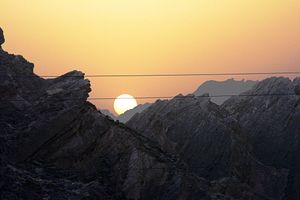This week marks the end of an important year for Pakistan with several significant developments in the realm of foreign affairs. With many of the China-Pakistan Economic Corridor’s various deliverables taking off, as well as a slump in terrorist attacks, and a marginal improvement in economic indicators, the country’s profile does look promising going into 2017 despite significant challenges that remain.
Possibly, the most important event this year was the retirement of Chief of Army Staff General Raheel Sharif in November. He presided over a term that was characterized by greater domestic stability, a crackdown on militants, and the indiscriminate use of force against terrorist groups. The peaceful transition from one chief of army staff to another is also indicative of political stability in the country as 2017 approaches.
On the foreign policy front, Pakistan’s relations with China have continued to blossom, with CPEC being the focal point of cooperation and goodwill, and the symbol of the indomitable nature of the bilateral ties that both countries share. The election of Donald Trump in the United States this year and his initial vituperative statement against Pakistan in his campaigns may continue to prompt policymakers in the country to draw closer to Russia and China on the foreign policy front, particularly as the latter expands its economic clout in the country.
The relationships with Afghanistan and India, however, have been characterized by hostility, suspicion, and animosity. This is best exemplified in the controversial castigation of Pakistan at the Heart of Asia conference in Amritsar by both President Ashraf Ghani and Prime Minister Narendra Modi this year. This tirade against the country was the culmination of a consistent trend that slowly emerged throughout the year, with Pakistan’s efforts to reach out toward cooperation and connectivity being met with little consideration by both countries. This defiance by Afghanistan and India may further prompt Pakistan to seek China’s assistance, with Beijing potentially acting as an umbrella against Indian threats and aggression.
Similarly, there is an equal need for Islamabad to cement its relationships with other countries in the region, particularly Iran, which had earlier expressed an interest in joining CPEC. Additionally, as far as member countries of the South Asian Association for Regional Cooperation are concerned, the deteriorating relationship between Pakistan and Bangladesh — another key characteristic of 2016 — opens up bilateral opportunities with countries such as Sri Lanka and the Maldives. The Sri Lanka-Pakistan relationship hinging upon common grounds of tackling domestic terrorism.
While 2016, undoubtedly, ends as yet another dismal year for U.S.-Pakistan relations, U.S. President-Elect Donald Trump’s arrival at the White House in January, does offer an opportunity for both countries. His praise of Prime Minister Nawaz Sharif and the citizens of the country just recently, along with his non-interventionist stance during the election campaign, offers the prospect of a manageable relationship between both countries particularly in times, when relations with India have deteriorated as a result of events such as the 2016 Kashmir crackdown. The Trump administration’s potential role as an arbiter in resolving the crisis serves as a positive sign for Pakistan in stark contrast to Trump’s stance on nuclear weapons and proliferation, which can be interpreted in a variety of ways. Of U.S.-Pakistan relations, it can be safely said that a lot depends on what transpires after January 20 next year.
In a nutshell, as 2017 approaches, Pakistan has gained considerable ground as far as tackling its internal challenges are concerned. Its foreign policy should equally focus on capitalizing on opportunities presented in the Gulf region, and vis-a-vis Iran, and China, particularly if its relations with India and Afghanistan continue to sour. As a strategically significant state, the country can act as a hub for connectivity and its continuous progress in dealing with domestic terrorism and surmounting its challenges will only serve to boost its profile, regionally and internationally. In order for the promise of 2017 to be anything but short-lived, prudent policies to surmount domestic and international challenges need to continue unabated.
Hamzah Rifaat was a 2016 South Asian Voices Visiting Fellow at the Stimson Center and has represented Pakistan as a member of the CTBTO Youth Initiative of 2016 in Vienna.

































